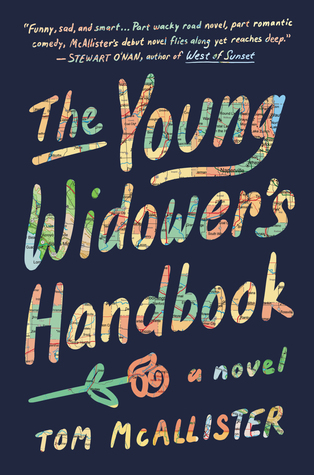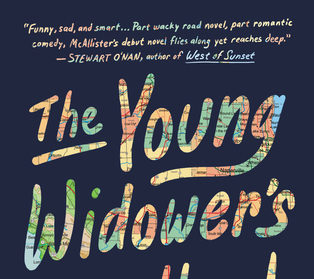Sarah Hoenicke review’s The Young Widower’s Handbook by Tom McAllister, the poignant, yet far from miserable tale of grief and loss and all that they encompass.

In his pleasantly hyperbolic fiction debut, The Young Widower’s Handbook, Tom McAllister engages his readers in the life of Hunter Cady and the memory of his wife, Kait, who dies early in the story. Almost everything we learn about Kait comes through Hunter – his recollections of their conversations, travel dreams, and personality differences. Kait’s death launches Hunter into a period of self-reckoning—he travels haphazardly around the U.S., talking himself through his grief and ignoring his life, which is falling apart.
Though college graduates, Hunter and Kait meet while both still living with their parents. They fall in love, get married, buy a house. They fantasise about where they’ll travel, but then stay at home and watch travel documentaries, they tell themselves, for research, and don’t go anywhere. Kait’s death makes Hunter realise how little he’s done with his life – he does unfulfilling work at a rental car agency. Kait’s ashes along for the ride, he sets out to see something of the States, thinking that it makes the most sense to start with his own country, and later to go farther afield.
Hunter’s trip is a long series of mishaps. He’s constantly thwarting himself—a habit that preceded Kait. Once, to avoid learning the skills of his outdoorsman father, he intentionally cut his hand as he was cleaning a fish so that he could return to the tent, where he had a video game hidden. He’s a dreamer whose only full deed was to fall in love with his wife. Rather than the handbook the title suggests, this is a prolonged warning label detailing how not to be human in love, a fate none of us can escape.
Hunter’s memories of the couple’s dialogue – their witty shared language – pull the story along. Without it, it would be easy to become mired in Hunter’s lethargic pessimism. He inveighs against capturing experiences rather than experiencing them, yet he rarely leaves the confines of his habitually sceptical mind to be present in his own life. Because of this, it becomes obvious early on that the culmination of the book must be him changing his ways.
That the plot is fairly predictable, however, does not inhibit the novel, since it’s Hunter’s narrative that matters, not the places he’s going. McAllister’s skilled mixing of the morbid with the mundane creates a comic effect, and sneakily causes the reader to care. When things become (still comically and absurdly) tense—as when a renaissance fair actor takes the box containing Kate’s ashes from Hunter without knowing what’s inside—almost unreasonable anxiety arises in the reader.
Still, grief sometimes talks in clichés, and Tom McAllister sometimes resorts to stereotypes. Hunter recalls the eyes of his wife as, “like polished jade.” Though the book shows an awareness of women’s experiences (“It takes women a long time to be comfortable with who they are,” Kait says), some of the female characters feel less than real. Hunter’s mother, Willow, especially, and Kait’s mom, Sherry, are too much like what one would expect from each of their respective “types” – the late-life hippy, and the white trash (Hunter’s words) ignoramus. It must be said, though, that Kait feels real. Her fears, her humour, her love for Hunter – she’s fully flesh, not easily reduced.
It feels wrong that the word one most associates with this book about a young man losing his wife is “light,” but the novel doesn’t evoke much sadness. McAllister downplays the big moments – Kait’s death, Hunter leaving home – and lengthens the moments that, in life, are often the more poignant: the spans of days or weeks in which decision feels impossible; the barrage of family; the turning over of remembered moments in love. Hunter’s little failures – his semi-cruel reactions to Kait – save the book from itself. When he makes fun of her needing a nightlight, without realising she truly needs it to feel comfortable, they become real people each of us has known, and keep the book from sentimentalism.
By the end, we’ve spent so long with Hunter and his limitations that it’s a relief to see him clean himself up. Obviously, that is how he’ll heal himself—by fixing up his house, letting Kait go, making up with his in-laws, talking, and sleeping. This story is all about ideals vs. reality. McAllister’s biggest victory is that he allows the reader at once to be annoyed with Hunter’s limited worldview and to hope for the best for him. It earns him his ending, which I won’t say any more about. This one, you should read for yourself.
Wales Arts Review is home to the best critical writing from and about Wales.











